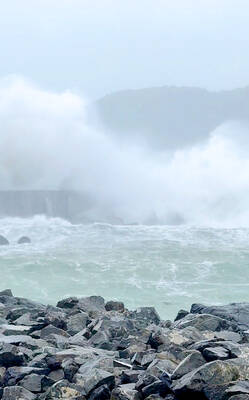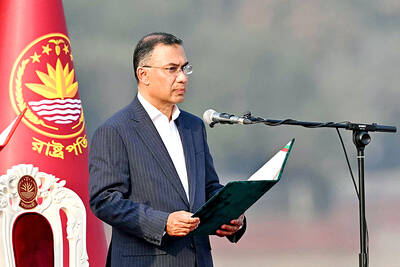Two months before Afghanistan holds its first election for president, preparations have an air of democratic bustle.
Nearly 9 million eligible Afghans have registered to vote so far, several million more than expected, despite efforts by the Taliban to disrupt the process. NATO has agreed to provide extra forces to help the 18,000 US troops who are maintaining security.
The incumbent, President Hamid Karzai, and 22 opponents have registered for the race and are starting to hold rounds of news conferences and rallies.
Despite the trappings of a democratic election, the real decision about who will be elected president in October, and elected to Parliament next spring, will probably be made at meetings taking place right now in guest houses around town, where heavily armed guards idle outside near SUVs with tinted glass.
Inside, men who command thousands in their own private armies, some of them veterans from the wars against the Soviet Union and the Taliban, are deep in discussion.
Will they back Karzai, who has vowed, with US and international backing, to disarm them and build a unified national defense corps? Or will they form new alliances in opposition?
Whichever way they choose, their soldiers, or mujahedeen, and their local communities are likely to follow their instructions at the polls.
That means that Karzai may not be the shoo-in he was thought to be, unless he works out a deal with the regional commanders and governors who have become his single biggest challenge as he tries to maintain power and build democratic institutions. Their anger at him is rising.
"Karzai was the strongest candidate," said Massouda Jalal, the only woman running for president, who came in second to Karzai in the vote for leader of the transitional administration in 2002 at the loya jirga, or national assembly. "Now he is one of the strong candidates."
Jalal and others say that Karzai, whom opinion polls show to be overwhelmingly popular, may fail to win a majority of the votes and thus be forced into a runoff election. To gain the mandate to establish a strong central government, Karzai wants not only to win, but to win big.
Karzai went so far as to drop the most powerful leader of mujahedeen from his ticket, an action that has won him praise in some quarters but anger in others.
That was the powerful defense minister and vice president, Marshal Muhammad Qasim Fahim, who has since led the defection from Karzai.
"Karzai from now on will not have the support of the big group in the Cabinet and the government that he has had in the past," said Fahim, an ethnic Tajik who is expected to take with him the support of most of the mujahedeen in the north.
Abdul Shakur Waqef Hakimi, a spokesman for Jamiat-e-Islami, one of the largest mujahedeen parties, said, "From the beginning the mujahedeen genuinely supported the government, but then Karzai made mistakes and he lost the support of the mujahedeen."
The mujahedeen are now rallying around Muhammad Yunus Qanooni.

Heavy rain and strong winds yesterday disrupted flights, trains and ferries, forcing the closure of roads across large parts of New Zealand’s North Island, while snapping power links to tens of thousands. Domestic media reported a few flights had resumed operating by afternoon from the airport in Wellington, the capital, although cancelations were still widespread after airport authorities said most morning flights were disrupted. Air New Zealand said it hoped to resume services when conditions ease later yesterday, after it paused operations at Wellington, Napier and Palmerston North airports. Online images showed flooded semi-rural neighborhoods, inundated homes, trees fallen on vehicles and collapsed

‘COST OF DEFECTION’: Duterte’s announcement could be an effort to keep allies in line with the promise of a return to power amid political uncertainty, an analyst said Philippine Vice President Sara Duterte yesterday announced she would run for president of the Southeast Asian nation of 116 million in 2028. Duterte, who is embroiled in a bitter feud with Philippine President Ferdinand Marcos Jr, was impeached last year only to see the country’s Supreme Court throw the case out over procedural issues. Her announcement comes just days before her father, former Philippine president Rodrigo Duterte, begins a pretrial hearing at the International Criminal Court (ICC) in the Netherlands over crimes against humanity allegedly committed as part of a brutal crackdown on drugs. “I offer my life, my strength and my future

NOT YET THERE: While the show was impressive, it failed to demonstrate their ability to move in unstructured environments, such as a factory floor, an expert said Dancing humanoid robots on Monday took center stage during the annual China Media Group’s Spring Festival Gala, China’s most-watched official television broadcast. They lunged and backflipped (landing on their knees), they spun around and jumped. Not one fell over. The display was impressive, but if robots can now dance and perform martial arts, what else can they do? Experts have mixed opinions, with some saying the robots had limitations and that the display should be viewed through a lens of state propaganda. Developed by several Chinese robotics firms, the robots performed a range of intricate stunts, including martial arts, comedy sketches and choreographed

POST-UPRISING: Bangladesh Nationalist Party lawmakers were yesterday expected to formally elect Tarique Rahman as their leader and new head of government Bangladesh’s prime minister-to-be Tarique Rahman and lawmakers were yesterday sworn into parliament, becoming the first elected representatives since a deadly 2024 uprising. Rahman is set to take over from an interim government that has steered the country of 170 million people for 18 months since the autocratic government of Sheikh Hasina was overthrown. The lawmakers, who promised loyalty to Bangladesh, were sworn in by Chief Election Commissioner AMM Nasir Uddin. Bangladesh Nationalist Party (BNP) lawmakers are expected to formally elect Rahman as their leader, with President Mohammed Shahabuddin then to administer the oath of office to the prime minister and his ministers